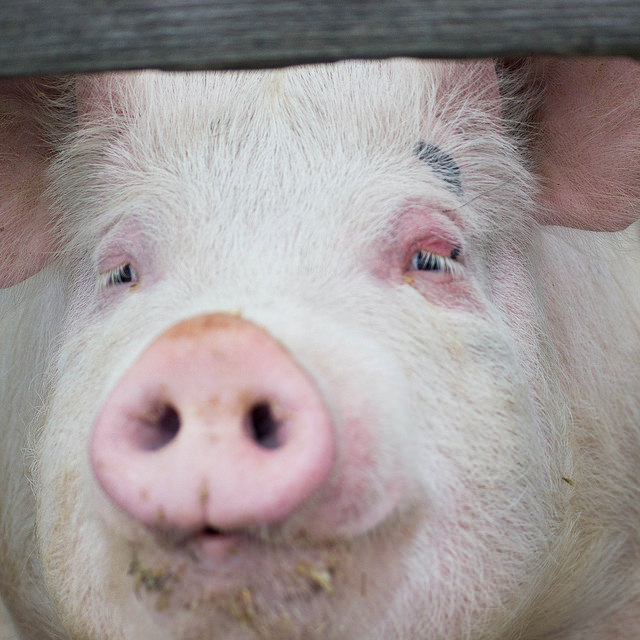
I recently went to a community meeting about the fear that more Concentrated Animal Feeding Organizations (CAFO) may be setting up in our area.
Iowa already has a larger proportion of CAFOs than many other states, and most of them are pig farms. There are more than 8,500 factory farms in Iowa alone, and in a pig farm, each building often contains around 2,400 hogs.
Fortunately, due to the work of a local community group, there haven’t been as many set up in my immediate area as there are in other parts of Iowa. In Iowa, neighbors have been able to launch lawsuits against the people setting up the CAFOs nearby using the right to complain under what are called “nuisance” suits. What was scary to hear is that other states like Missouri have removed people’s rights to do this.
I was especially touched by the story of Jocelyn Engman. She grew up in Iowa and went to the city and obtained a degree in Chemistry. Then she and her husband, who is also a chemist, decided to return to work the family farm. They thought about setting up a pig CAFO but didn’t feel it was right to confine pigs like that, so they decided to set up an organic farm called Pickle Creek Herbal instead and have been running it now for almost 10 years.
But then, a CAFO set up within a quarter-mile of her grandmother’s house. When she went to visit, she could smell the pigs even in her grandmother’s living room. Soon afterward, her grandmother developed a respiratory condition and died. (Although, we can’t be completely certain there is a link between the two events.)
Later, when some CAFOs were about to set up close to her own property, she read the research and discovered that because of the highly concentrated chemicals being emitted, respiratory conditions (and other serious illnesses) are often contracted by neighbors. Being a chemist herself, she was able to read the research studies in some detail. Her father meanwhile is now living in her grandmother’s house.
Based on what she has learned, she has decided to stand up for her rights and to block the development of the CAFOs nearby. She has decided to do this, even though it is difficult in a small farming community where often the people you see in church each week are the farmers setting up the CAFOs.
During the evening, we were also told about how many of those in government both at a local, state and federal level are often being influenced (some would say “paid”) to support the large farming interests. For example, one Iowan politician went for a trip to China to try and set up more pork exports. Farmers are given large subsidies to set up CAFOs. But what most people don’t realize however is that many of the companies setting up CAFOs in the U.S. are Chinese companies (pork) and Brazilian companies (poultry).
The other worrying concern with CAFOs is that the large amounts of concentrated waste they produce often end up contaminating drinking water. Even cities like Des Moines have recorded nitrates above the level recommended under the Clean Water Act, and smaller cities don’t have any facilities to remove excess nitrates.
The toxicity of the smell of the manure (as shown by the above stories) also raises concern, because there are a lot of farms which have spread this manure on them as fertilizers. They have to submit waste management plans, but when people are trained in how to read these plans have studied them, often they find errors which means that they are spreading more than approved amounts of these toxic manures on to their fields.
So what does this have to do with smells?
Apparently, these large CAFOs have giant fans that blow the toxic smells out of the CAFO itself and thus spread their deadly chemicals far and wide. At the meeting, the story was told of how two Iowa farmers died (a father and son) when they went into the hog farm manure pit when a piece of equipment they were using fell into it. They were overcome by the hydrogen sulfide methane, ammonia and carbon dioxide CAFO fumes. This just shows how toxic these chemicals are. [A father and son were also killed at a Wisconsin hog manure pit and in Virginia four family members and a hired farm hand were killed by gases at a dairy farm.]
You may wonder how the people who set up the CAFOs on their land can cope with the smells themselves. Well, they obviously try to use the fans to direct the smells away from their house, but even so, because of their close proximity, they obviously do smell the CAFO. However, because the nervous system quickly adapts to continuous exposure to smells, awareness of the smell is lost.
Many years ago, when I was driving around rural Tasmania in Australia, I remember stopping to look at a sow that was sprawled out on its back in the fresh air and sunshine with lots of piglets feeding at its side. It was clean, not dirty at all. It was such an image of contentment and joy. Such a contrast to the life of pigs in CAFOs. I have also seen wild feral pigs, which is a bit scary because they can kill you. They dig up the roots of trees. People think pigs like being in mud, but I think it is just because they like to eat roots. We eat potatoes and they are roots, too. Does that make us dirty and deserving of confining in a cage?
I grew up in the country, and my father was a dairy farmer and later a banana grower. My uncle had a poultry farm. But this was years ago, and the cages were bigger than they are now, and the chickens weren’t given growth hormones back then. He had a relationship with his chickens. I remember him showing me how they would all make a ruckus if he took his hat off, because they wouldn’t recognize him and they would think they had a stranger in their home. At school, I studied agriculture and we used to go to the “ag plot” a short walk from school. One time, we got to move the newly hatched chickens—they were such cute balls of fluff. It is sad to think of them growing up in tiny cages in the U.S.
You may have heard recently about the millions of chickens in Iowa that had to be burned to stop the spread of disease. Having animals in close confinement makes the effects of such diseases even more devastating. Some farmers are turning to essential oils in an effort to find ways to prevent the spread of diseases. For example, research published in the journal Poultry Science found that chickens who were given feed with added Oregano Essential Oil had a 59 percent lower mortality rate due to “ascites,” a common poultry infection, than untreated chickens.
But obviously, taking animals out of confinement would be the best way to slow the spread of such diseases. However, regulations need to be put in place as to how many chickens you can have crammed into each acre as “free range chickens.”
So what can we do to stop CAFOs?
Consumer demand for meat and eggs that aren’t produced using CAFOs really can help. For example, in Australia, where I am from, and where there is a lot in the press about animal rights, the large supermarket chains noticed that people were buying more “cage-free eggs.” Then, one of the two largest supermarkets (Coles), stopped selling eggs from CAFOs altogether. The other large supermarket chain—Woolworths—had to respond, and they did by saying they would phase out caged eggs by 2018. In Woolworths, the percentage of caged eggs being sold has already dropped to 50 percent, from 70 percent in 2009. This shows what consumer demand can do.
So, if you want to stop CAFOs, support animal welfare charities, share Facebook posts and blogs about it and stop buying eggs and meat that aren’t free-range. If it is free-range, it will say so on the packet, so don’t buy it unless it says that. If a restaurant is using it, they will generally state that on the menu.
Relephant:
5 Haunting Photos: a Bird’s-Eye View of what Factory Farms Do to Our Land.
~
Author: Stephanie Chambers
Editor: Travis May
Photo: Flickr/Eric.Ray






Read 0 comments and reply